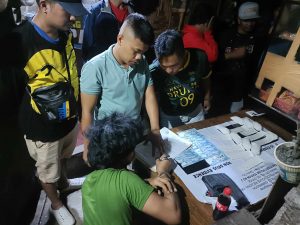IATG seen to address commercial and illegal quarrying in Davao City
AN ENVIRONMENTAL group is hopeful that the newly formed inter-agency task group IATG will help address the problem of commercial and illegal quarrying operations in Davao City.
Executive Order No. 48 created the IATG to look into quarrying operations, “such as but not limited to earth fill, sand and gravel, and limestone quarry materials.” The order was released on Aug. 12, 2020.
The Interfacing Development Interventions for Sustainability (IDIS) Inc. was also named as one of the members of the task group. The other members of the IATG include the Mines and Geo-Sciences Bureau XI as vice-chairperson, and the head/representatives of the City Engineer’s Office, City Planning and Development Office-Zoning Division, City Treasurer’s Office, Department of Environment and Natural Resources Office, Mindanao Association of Mining Engineers, Society of Filipino Foresters, Inc., and the City Environment and Natural Resources Office as the chairperson and secretariat of the task group.
The members of this IATG are tasked to conduct regular ocular inspections, prepare reports on violations and recommendations, monitor and ensure all terms and conditions of quarry permits are complied with, formulate mitigating measures to properly address any negative environmental impact during operation, and make a periodic report to the mayor.
Since 2018, IDIS, as a member of the Local Zoning Review Committee, has been opposing the approval of all quarry operations in Davao City.
IDIS executive director Chinkie Pelino-Golle said there was no clear monitoring system being implemented to ensure that quarry operators are only extracting the allowable volume of sand, gravel, and other non-metallic resources stipulated in their permit and there are no clear rehabilitation actions done on areas being quarried.
Also, IDIS has long been urging the LGU, particularly the CENRO and the City Mining Regulatory Board, to conduct the threshold capacity study of the river systems where quarry operations are allowed. The need for the said study was also echoed by Councilor Mabel Acosta, who was the lone opposer to the approval of 30 mining applications in December 2018.
With this IATG, the monitoring of quarry sites and activities will be done frequently to check actual compliance of operations and real-time conditions in the area. This is also to ensure that all permitted quarry sites and operators comply with environmental policies. Moreover, this is to ensure that no quarry sites will be allowed to operate within or near the city’s conservation areas as the City’s Comprehensive Zoning Ordinance prohibits the “exploitation of quarry resources and commercial and sand and gravel resources” and Watershed Code also “prohibits quarrying in conservation areas and in Agroforestry and Agricultural Non-Tillage Areas.”
“We appreciate the inclusion of IDIS in the IATG composition and the LGU should expect our continuous opposition to the approval of quarry operations until the study is done,” Golle said, adding that they will lobby for a more comprehensive and systematized approval, implementation, and monitoring of non-metallic mining in the city.
“We also expect the environmental violators to be penalized and lastly, we will also check if quarrying really contributes to the local economic development and not just contributes to further environmental degradation,” she added.
Last year, IDIS conducted case studies regarding the environmental management of sand and gravel quarry.
“With this membership [on IATG], we can directly contribute in monitoring, mapping, validating, inspection, present results to the board, as well as continue on lobbying for the execution of more studies, like the capacity and threshold assessment so that there is a rational and scientific decision making of allowing or disallowing quarry applications,” EnP. Lemuel Lloyd Manalo, IDIS environment research specialist, said.




